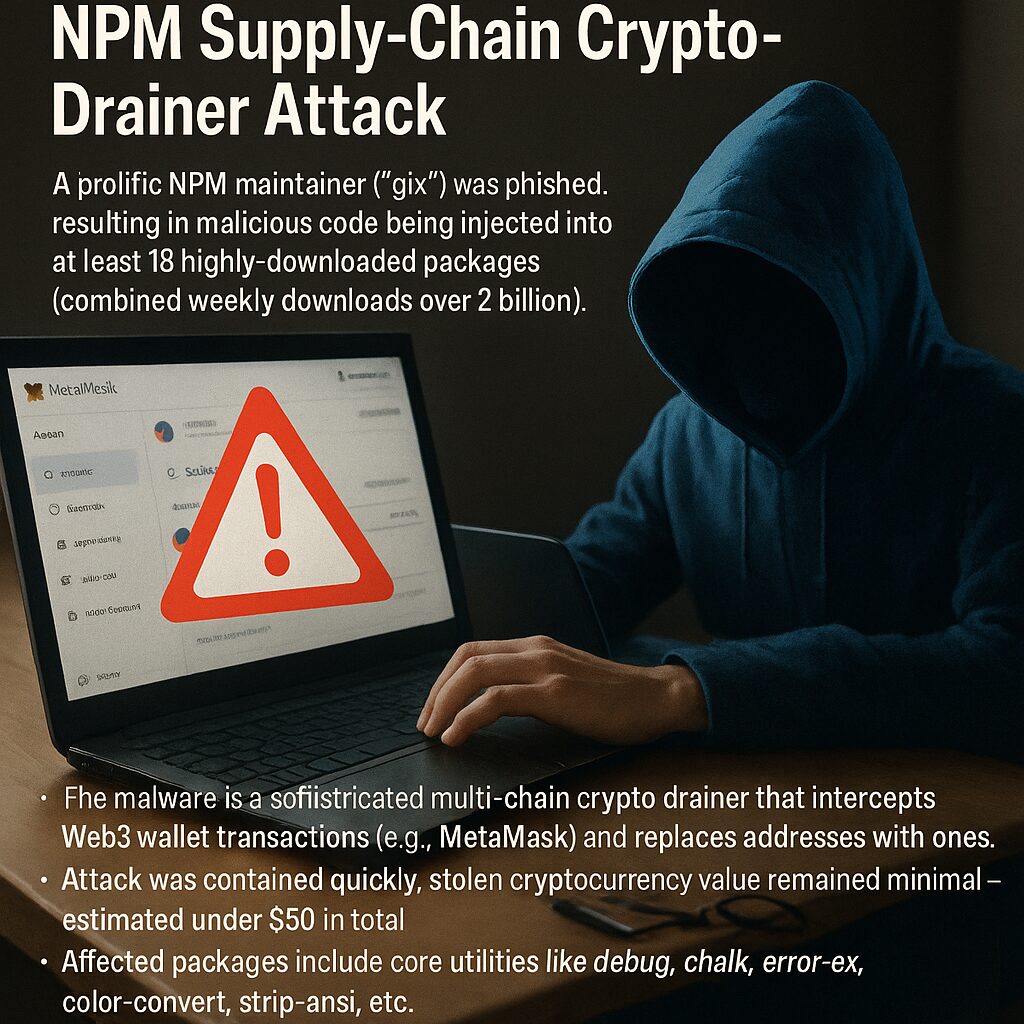
Main Points :
- A prolific NPM maintainer (“qix”) was phished, resulting in malicious code being injected into at least 18 highly-downloaded packages (combined weekly downloads over 2 billion).
- The malware is a sophisticated multi-chain crypto drainer that intercepts Web3 wallet transactions (e.g., MetaMask) and replaces addresses with attacker-controlled ones.
- The attack was contained quickly; stolen cryptocurrency value remained minimal—estimated under $50 in total.
- Affected packages include core utilities like debug, chalk, error-ex, color-convert, strip-ansi, etc.
- Experts urge developers to perform dependency auditing, verify wallet transaction screens, and consider halting on-chain operations until the scope is fully understood.
- Broader ecosystem context: supply-chain attacks targeting NPM, blockchain wallets, and dev tools continue to rise.

1. Background and Scope of the Attack
A major software supply-chain attack struck the JavaScript ecosystem in early September 2025. Attackers performed a phishing campaign targeting “qix,” a prolific maintainer of dozens of widely-used utility packages. Once they compromised this maintainer’s NPM account, they injected malicious cryptocurrency-draining code into at least 18 packages—utilities such as debug, chalk, error-ex, color-convert, strip-ansi, among others—collectively experiencing over two billion downloads weekly.
2. Methodology: How the Malware Works
The injected code is a highly obfuscated multi-chain crypto-drainer. It executes silently in the browser context, targeting Web3 wallets like MetaMask. Effectively, the malware intercepts transaction requests and replaces the legitimate recipient address with one controlled by the attacker, thus hijacking funds.
3. Impact and Losses
Despite the wide reach, actual financial losses were minimal. The crypto-intelligence firm Security Alliance confirmed less than $50 worth of cryptocurrency was stolen. Still, the attack is noted as the largest NPM compromise in crypto history due to its scope and method.
4. Ecosystem Response
- Containment: Aikido’s monitoring systems identified the malicious updates and triggered swift removal of compromised package versions.
- Expert Warnings: Ledger’s CTO, Charles Guillemet, underscored the gravity of the incident, warning of similar attacks severely targeting Web3 infrastructure.
- Security Guidance: Users are urged to audit projects, check for dependency fixes, and carefully verify transaction recipients—especially when using software wallets like MetaMask.
5. Broader Context: Trend of Supply-Chain Attacks
This incident is part of a growing wave of NPM supply-chain attacks:
- Other packages impersonating Flashbots used npm to exfiltrate wallet keys and seeds via Telegram.
- Building tools like Nx were compromised with infostealing malware via AI-enabled attacks targeting developer credentials and crypto wallet data.
These underscore an evolving threat landscape where software dependencies become vehicles for crypto-theft and credential compromise.
6. Recommended Developer Practices
- Dependency Audits: Regularly scan and vet all project dependencies; watch for security alerts.
- Verify Transactions: Always double-check transaction details on hardware wallets or via on-device confirmation.
- Use SBOMs: Implement Software Bill of Materials for transparency over your supply chain.
- Collective Pinning Awareness: Research suggests simple pinning may not mitigate risks and can even expose projects to outdated or still-malicious versions.
Conclusion
This supply-chain compromise via phishing of an NPM maintainer demonstrates how trusted JavaScript libraries can become powerful attack vectors in the crypto-clearing ecosystem. Although the actual monetary loss was low, the potential for future, more damaging exploits is profound. Developers and blockchain practitioners must enhance security hygiene—auditing dependencies, verifying transaction details, and staying vigilant against evolving threats. Only then can the decentralized ecosystem remain resilient.

